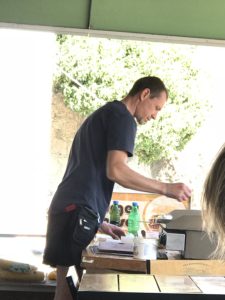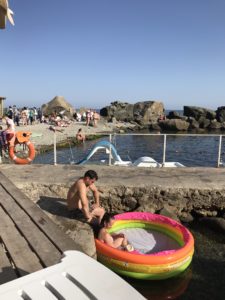My experience with Russian and Crimean people has always been positive. This hospitality is deeply embedded in their culture and moral values.
People Who Are Strangers
There are categories of relationships that define how people treat you in Russia and Crimea. I have found these categories of people hold across all the areas of the former Soviet Union that I have visited, or from where friends come from.
Strangers will normally ignore you, for the most part. They do not make eye contact like Americans do. As you mingle with people on the street, they will move over to allow you to pass. They will not get into your business, and expect you to stay out of theirs.
When riding a bus, or the metro (subway), you are expected to follow a strict code of respect. People will always give a seat to women with toddlers, then small children, and the elderly. Other riders will scold a person that does not give up their seat for one of these classes of people. Get off the bus quickly to respect the time of others. Other riders will scold you, otherwise.
People riding the bus are honest. Riders will pass money to the bus driver from back to front. The correct change will make its way back through you, as well.
Service People
Americans expect service people to always be polite, and to bend over backwards to help a customer. Do not expect this behaviour from Russians. When you go into a store, you will have to ask if you need help. Do not expect service after the sale. Once you buy something, you own it.
Ordering food at a restaurant is sometimes a gamble. If you get a chicken shawarma when you order a pork one, just eat it. It is not worth the argument, and the restaurant will not waste the food.

Fruit and vegetable stand women seem the friendliest. They are helpful in picking the best produce. Of course, a pleasant smile from a man never hurts, even across language borders. I also found airline stewardesses quite pleasant (I flew S7 Airlines). Their customer service people, not so much.
Government Workers
Americans expect slow service from government workers. The general thought is that they are secure in their jobs, and have no worries. Russian government workers are no different. However, slow to an American is lightening speed compared to a Russian government office. The women who hold these jobs are quick to shout, and it is common to hear them say “I do not have time today. Come back next week.” I went to the Post Office to register my visa in Crimea 3 times before being told I had to go to another office.
A man is usually in charge of the government office. You will find him easier to deal with, but difficult to get in to see. I made friends with the Ministry of Internal Affairs director (MVD – or МВД).
Friends and Acquaintances
Friends and acquaintances are a different story altogether. They will always show up at your home with a small gift. The gift can be wine, or a tort, or some other small item. You should always bring a small token with you if you visit them.
They will be eager to hear how things are better in Russia or Crimea than in the United States. The pride people have in their country is unmeasurable. As a result, it is always bad form to tell them that things are better in the USA. If you tell them that some things are better, expect to list the items and hear a counter argument.
Be careful not to admire something a friend has. They will consider that you are asking for it and they will give it to you.
Children
I find children in Crimea to be quite different than children in the USA. They know how to occupy themselves without internet and video games. At the beach, younger children are topless without shame (yes, girls too). People view the children as innocent, and do not make them grow up and be, well, like American kids.

There are special beaches that are for children. They are safe, and people watch out for each other’s kids. These beaches have playgrounds, and are protected from the rough seas.
I have even experienced people (like my wife) carrying the stroller, with a child, up the steep stairways for young mothers.
Family Members
Family is an interesting subject. As I mentioned earlier, common courtesy says you bring a small gift when you visit. However, one has to be careful with family generosity, or you may taken advantage of.
It might start with small requests, such as for toiletries. What I have found is these items are available in Russia and Crimea. However, you are expected to bring these small things from America. This will turn into requests for more and bigger items, such as mobile phones, computers, or money.
If you are not careful, you may even find a relative living in your home. In my case, I ended up buying my home back from a relative who registered the home in her name.
As a friend of mine from Belarus told me “End big expectations quickly, or they will get bigger.”
Mothers-In-Law
I can only speak for my mother-in-law. She is a good woman, who looks out for her family. Sometimes too much so.
We never want for food, regardless of how much or little she has. She cooks, cleans, and takes care of our home when we are not in Crimea. In fact, despite owning an apartment in the building next door, she lives in our condo during our absence. She sometimes forgets who owns the condo. I often use the term “may dom” (my house) often, despite it being considered impolite. However, see my Belarus friend’s comment above.
Special People
My wife’s cousin is an example of the best in family hospitality. Her request to us was a bag of Kona coffee. We gave her four kilns instead, which thrilled her. When we arrived in Moscow, she picked is up at the airport, got us to our hotel, and took us to sights she thought would be interesting. She was a tad annoyed that we arranged our own hotel, and not allowing her to arrange and pay for one. My wife’s cousin is tops.
Closing Thoughts
For more on riding the bus, or more on Crimea in 2017, see my other links.
Now back to the Crimean sunrise.
3 thoughts on “People of Russia and Crimea – My Experiences in 2017”